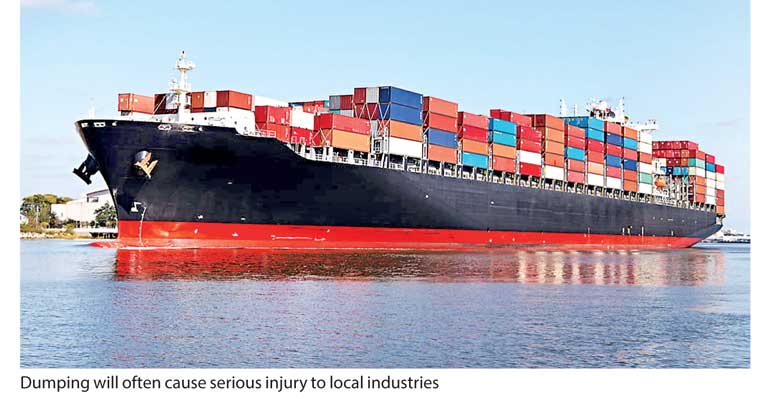Sunday Feb 22, 2026
Sunday Feb 22, 2026
Friday, 10 November 2017 00:00 - - {{hitsCtrl.values.hits}}
 Trade liberalisation should in general be preceded by strengthening of institutional structure and enacting the relevant legislature in a country.
Trade liberalisation should in general be preceded by strengthening of institutional structure and enacting the relevant legislature in a country.
During the past few years, academics, professionals and entrepreneurs have steadfastly called for the required domestic policy reforms before liberalisation of trade as Sri Lanka is in the process of negotiating Free Trade Agreements with China, India and Singapore, etc.
It is praiseworthy that required changes are being made one after another. As we know, the National Trade Policy received Cabinet approval in August and now the Anti-Dumping and Countervailing Duties Bill and Safeguard Measures Bill have been drafted to be presented in Parliament soon.
Dumping will take place when a company exports a product to another country at a price far below the normal price of the home market. Theoretically, dumping can be considered as one of the forms of price discrimination. Dumping is detrimental to the economy of destination country because it will force out domestic producers from the market, paving the way to foreign supplier or suppliers monopolise the market.
Dumping will often cause serious injury to local industries such as closure of some business entities particularly SMEs which cannot compete with the products that are being dumped which would in turn result in loss of employment and income earning opportunities.
The WTO agreement on anti-dumping and countervailing duties provides important guideline to member countries for regulation of dumping. The anti-dumping agreement is an extension of Article VI of GATT.
According to the provisions of the proposed Anti-Dumping Bill, the Director General of the Department of Commerce is vested with powers to determine the imposition of anti-dumping duties upon an investigation into alleged dumping.
The investigation carried out by DG-Commerce should satisfy three conditions, namely: (a) The product is being dumped to local market (b) The likelihood the damage being caused to local industry (c) Causal link between dumping and damage to the local industry.
According to Section 14 of the Act, an investigation into dumping can be initiated upon receipt of application in a  prescribed format in writing to the DG Commerce. Each application has to be supported by producers in Sri Lanka for particular product whose aggregated production accounts for a minimum of 25% from the total domestic production.
prescribed format in writing to the DG Commerce. Each application has to be supported by producers in Sri Lanka for particular product whose aggregated production accounts for a minimum of 25% from the total domestic production.
However, in the case of fragmented industries, where no producer has substantial market share, the DG Commerce may decide whether to proceed with the application or not. Under special circumstances, the minister who is in charge of trade can direct the DG Commerce to initiate an investigation on dumping without an application of interested parties.
The Act has laid down that the anti-dumping investigation has to be completed by the DG-commerce within a period of one year except under special circumstances. The important feature is that during the period of investigation, interim relief can be sought to prevent any further damages, similar to the provisions of WTO agreement. According to section 48, anti-dumping duties either should be ad valorem or specific duties to avoid complications.
Similar to the provisions related to anti-dumping duties, the DG Commerce is vested with powers to determine the imposition of countervailing duties following an investigation subject to certain conditions: (a) Particular product received specified subsidy as stipulated in the Act (Prohibited subsidy or actionable subsidy) (b) Damages to the domestic industry (c) Causal link between the imported product and damages. The different types of subsidies that lead to the imposition of countervailing duties have been set out extensively in the Act.
Although anti-dumping measures are important for the protection of local economy, those measures should not be used as a tool of protectionism, to prevent low price imports and whereby avoid competition or shield inefficient industries. Abuse of anti-dumping measures has been reported in certain countries during the recent past. Therefore the proposed Anti-Dumping and Countervailing Duties Act should be applied in a manner that protects not only the interest of local industries but also the interest of consumers.
The National Trade Policy, Anti-Dumping and Countervailing Duties Bill and Safeguard Measures Bill are now in place and hence the Government should consider introducing a trade adjustment package which is an important pre-condition of trade liberalisation.
(The writer is a consultant to a leading trade support institution in Sri Lanka).